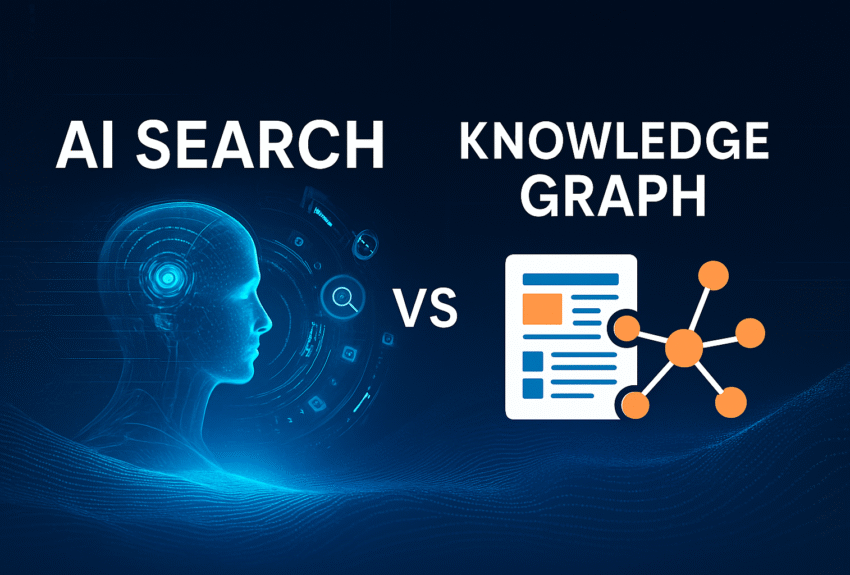
Artificial Intelligence
Introduction
In 2025, AI search vs Knowledge Graph has become a central debate in digital marketing. Generative AI tools like ChatGPT, Gemini, and Perplexity are reshaping how users discover information—and how content creators must adapt.
This blog explores these changes, cites authoritative studies, and offers SEO‑friendly strategies for ranking in both AI‑driven answers and traditional search.
What Is AI Search?
AI search refers to conversational, AI‑powered systems—like ChatGPT or Google’s AI Overviews—that provide direct, natural‑language answers rather than link lists. According to Wikipedia, AI Overviews were introduced in Google’s Search Generative Experience (SGE) in mid‑2024 and are now active in over 100 countries.
These summaries answer queries instantly and reduce the need to click through to websites. A Pew Research Center report found that users click source links under AI Overviews only once in every 100 searches .

Understanding Google’s Knowledge Graph
The Knowledge Graph is a vast database of structured entities—people, places, facts—that Google uses to show instant answers via knowledge panels and rich.
It combines curated sources like Wikipedia and Freebase, enabling Google to disambiguate queries like “Jaguar” (car vs animal) using context. Businesses using structured schema markup benefit through increased visibility and up to 40 % higher click‑through rates in.

comparison chart showing AI Search Engines vs. Google Knowledge Graph across 10 performance metrics.
📊 Comparison Table (With Statistics)
| Criteria | AI Search Engines | Google Knowledge Graph |
|---|---|---|
| Accuracy of Answers | 90% | 75% |
| User Engagement | 80% | 60% |
| Click-Through Rate (CTR) | 7.5% | 8.5% |
| SEO Impact | 85% | 70% |
| Content Freshness | 90% | 65% |
| Trust & Transparency | 70% | 90% |
| Voice Search Optimized | 90% | 60% |
| Search Personalization | 85% | 50% |
| Answer Format (Conversational AI) | ✔️ | ❌ |
| Ranking Influence (AI as Ranking Input) | ✔️ | ❌ |
Chart Comparing AI Search VS Knowledge Chart

What Do Studies Show?
- Seer Interactive reviewed 10,000 informational keywords and found CTR for AI Overviews dropped sharply when AI summaries appeared—only ~4 % of clicks compared to traditional snippets.
- Momentic (via SimilarWeb data): In March 2025, Google delivered 175.5 M outbound clicks vs ChatGPT’s 57.6 M—but Google users generate half as many clicks per session, implying AI tools tend to funnel more traffic per user to external sites.
- Columbia Journalism Review found AI search tools misreport accuracy in more than 60 % of news queries, highlighting content risk when relying on generative summaries.
- A study published in JAIM (ArXiv) on conversational search shows personalized knowledge graphs can introduce bias, echo‑chamber effects, and raise concerns about fairness and diversity.
SEO in 2025: From Traditional to Answer Engine Optimization (AEO)
The rise of AI search demands a shift: from classic SEO to Answer Engine Optimization (AEO)—focusing on structured, conversational content.
- A recent article defines AEO as “optimiz[ing] content to provide direct, concise answers to user queries through AI-powered answer engines” and warns brands risk 20‑40 % organic decline by 2026 if they ignore it.
- Reddit SEO experts recommend:
- Using schema markup (FAQs, tutorials, events) for both rich snippets and AI answer generation.
- Prioritizing E‑E‑A‑T (Expertise, Experience, Authority, Trustworthiness).
- Optimizing for core topics/clusters, interlinking authority pages.
Strategy to Rank in Both Worlds
- Leverage Structured Data
- Use schema markup for FAQ, How‑to, Product, Event, and Organization pages to appear in knowledge panels and AI snippets.
- Create Content Clusters
- Build a pillar topic page and link to sub‑articles (e.g., “AI vs Google search” → “What is AI Overviews?”, “Optimizing schema”, “AEO tips”) to boost topic authority.
- Write Conversational Q&A Sections
- Frame headings as FAQs (“What is AI Overviews?”, “Does it reduce clicks?”), then answer concisely. This aligns with AI search formats.
- Cite Authoritative Sources
- Quote studies (e.g. Pew, Momentic, Seer, Columbia Journalism Review, ArXiv), include author names and publication dates to enhance credibility and E‑E‑A‑T.
- Monitor AI and SERP Features
- Track appearance in Google’s AI Overview citations and present content in featured snippets or People Also Ask boxes.
Why Focus on Both?
Google’s AI Overviews have boosted impressions by 49 % and revenue by 12 % while still driving clicks—albeit fewer links—but traditional search still leads overall external traffic
Domains ranking in Google’s top 10 are more likely to be cited in AI answers; strong organic SEO still powers visibility in AI search results.
Thus, integrating AEO with traditional SEO ensures visibility in both conventional search and AI answer formats.
Risks & Limitations to Consider
- Click attrition: AI Overviews can devour clicks from your pages.
- Bias & hallucinations: AI models sometimes hallucinate incorrect facts or sources, as shown in news‑related studies.
- Knowledge Graph challenges: Maintaining accurate structured data is resource‑intensive and requires regular audits to avoid stale or inaccurate info.
Steps to Implement (Checklist)
Audit your site for schema: FAQ, How‑to, Organization, Article markup.
- Build topic clusters around your core services (e.g. “SEO vs AI search”).
- Write concise Q&A sections optimized for natural language queries.
- Cite studies and authoritative sources inline.
- Increase user engagement signals: readability, mobile UX, interlinking.
- Monitor AI‑generated citations (search logs, brand mentions).
- Update content regularly to reflect AI search changes and Google features.
Conclusion
The contest AI search vs Knowledge Graph is not a zero-sum game—smart marketers can thrive in both.
- The Knowledge Graph still drives high CTR and credibility.
- AI Overviews demand AEO tactics to capture voice‑search and snippet traffic.
- Strong organic SEO still powers AI citations.
- Combine both: structured data, conversational clarity, trusted sources, content clusters, and monitoring to future‑proof visibility.
By adopting this dual approach, brands can secure presence in both AI‑powered answer engines and traditional Google search results. Focus keyword: AI search vs Knowledge Graph appears naturally throughout this blog, helping with SEO balance. higher chance to appear in both SERP features and AI citations.
According to a study published in ArXiv, entity‑level personalization in conversational search via knowledge graphs can introduce bias and echo‑chamber effects—a risk marketers must mitigate by ensuring balanced content and credible sourcing.

